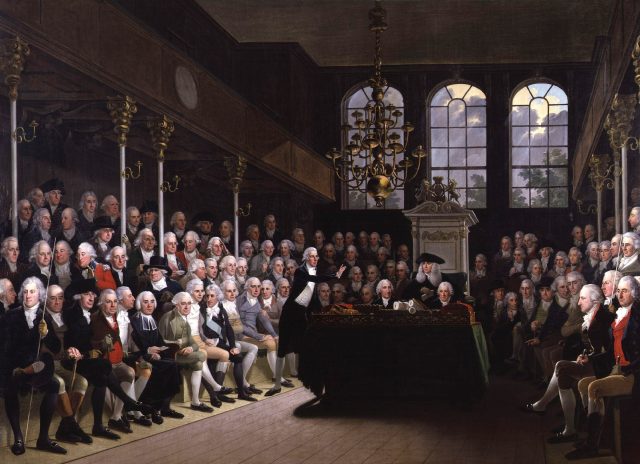
The Right came into being as a defence of time-tested practices, not as a demand for the reconstruction of society. In 1689, John Locke argued for limited government in response to the attempts by the Stuart kings to establish absolutism. His idea of a social contract was not new. In 1014, the Anglo-Saxon king Aethelred the Unready had fled to Normandy, and he was only able to return to England after promising the national assembly, the Witan, to uphold the law, to keep taxes low and to consult the Witan. This was a contract between the king and the people. In 1649, King Charles I was put on trial after his defeat in a civil war, and the presiding judge told him that there was a contract and a bargain made under oath between the King and the people, and that the bond was reciprocal. In 1688, the English Parliament passed a resolution that King James II had broken the original contract between king and people.
Conservative Liberalism
Later, David Hume plausibly argued that limited government was based on convention rather than a contract, while presenting a defence of private property as a response to limited altruism and scarcity. Then, Adam Smith rejected mercantilism, the attempt by the emerging European states to regulate commerce instead of allowing the spontaneous cooperation of individuals in the marketplace. Locke, Hume, and Smith articulated what later became known as classical liberalism, grounded in ancient practices, conventions, traditions and habits. In the French Revolution classical liberalism split however into a radical faction, represented by Thomas Paine and the French Jacobins, and the conservative liberalism of Edmund Burke, a friend of both Hume and Smith (and seen in the painting above by Anton Hickel of the House of Commons in 1793, standing on the right, 3rd from right in 2nd row).
The Meaning of the Right
Burke expressed with great eloquence the dispositions of the Right whereas the word itself, a handy simplification, derives from the French Revolution where in the Legislative Assembly of 1791 the supporters of a constitutional monarchy, limited government and social order sat on the right and the Jacobins on the left. In the nineteenth century, Benjamin Constant and Alexis de Tocqueville reinforced conservative-liberal thought, and in the twentieth century, so did Friedrich A. von Hayek. A fourth pillar of the Right, respect for traditions, was added to the three existing ones, limited government, private property, and free trade.
The Real Class Struggle
The Right recognised, unlike the Left, that government had to be limited even if power had been transferred from the kings to the representatives of the people. But since the Right supported private property, for most of the twentieth century it was seen as the party of the affluent. But now almost everybody has some property. The proletarians have no chains to lose, only their houses, cars, pension accounts, and holidays in Spain. Moreover, the Left is dominated by the arrogant elites of the universities and the media, with its absurd cancel culture and wokeism and evil antisemitism, and with no sympathy for the concerns and interests of the working class. Indeed, the class struggle now is between the working class and the talking class. In this struggle, the Right is aligning itself with the working class. In particular, it no longer supports unlimited immigration. Law-abiding, hard-working immigrants are still welcome, but not criminals, zealots, and freeloaders.
Hayek was Prescient
Europe has recently endured a flood of anti-Western asylum seekers and immigrants, mostly from muslim countries. They threaten our values and traditions, such as the hard-won respect for women, gays, and Jews. Hayek was certainly prescient when he wrote in The Times on 11 October 1978 that immigration must not be so great as to create hostile sentiments to other nationalities, although he certainly looked forward to a time when national boundaries would not hinder the free movement of men.



 Subscribe
Subscribe